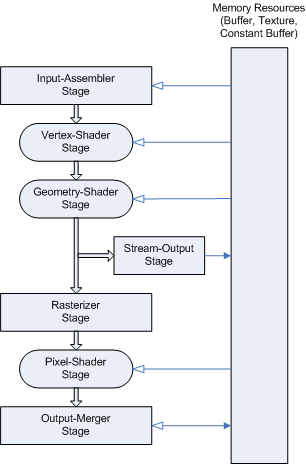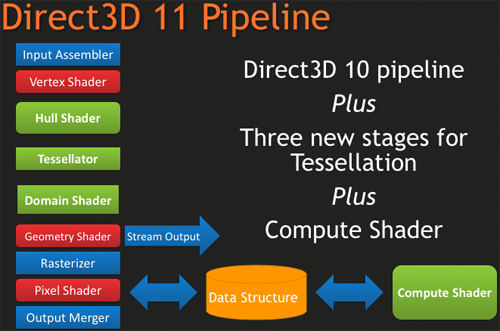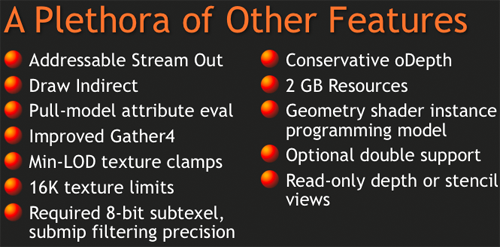Introducing DirectX 11: The Pipeline and Features
This is DirectX 10.

We all remember him from our G80 launch article back in the day when no one knew how much Vista would really suck. Some of the shortfalls of DirectX 10 have been in operating system support, driver support, time to market issues, and other unfortunate roadblocks that kept developers from making full use of all the cool new features and tools DirectX 10 brought.
Meet DirectX 11.

She's much cooler than her older brother, and way hotter too. Many under-the-hood enhancements mean higher performance for features available but less used under DX10. The major changes to the pipeline mark revolutionary steps in graphics hardware and software capabilities. Tessellation (made up of the hull shader, tessellator and domain shader) and the Compute Shader are major developments that could go far in assisting developers in closing the gap between reality and unreality. These features have gotten a lot of press already, but we feel the key to DirectX 11 adoption (and thus exploitation) is in some of the more subtle elements. But we'll get in to all that in due time.
Along with the pipeline changes, we see a whole host of new tweaks and adjustments. DirectX 11 is actually a strict superset of DirectX 10.1, meaning that all of those features are completely encapsulated in and unchanged by DirectX 11. This simple fact means that all DX11 hardware will include the changes required to be DX 10.1 compliant (which only AMD can claim at the moment). In addition to these tweaks, we also see these further extensions:

While changes in the pipeline allow developers to write programs to accomplish different types of tasks, these more subtle changes allow those programs to be more complex, higher quality, and/or higher performance. Beyond all this, Microsoft has also gone out of its way to help make parallel programming a little bit easier for game developers.










109 Comments
View All Comments
just4U - Wednesday, February 4, 2009 - link
While there might be some programs out there that definitely do take advantage of 8G of ram.. I haven't noticed that for Vista. It seems to hit a sweet spot at 4Gigs (or 3.3 for 32bit) I don't think 2Gigs of ram is optimal for Vista at all tho, and always push for 4 with all my builds.dzmcm - Tuesday, February 3, 2009 - link
Do yourself the biggest favor and Google kat mouse. I used ubuntu for a while and got spoiled by the mouse wheel functionality. This little program will allow your to scroll windows not in focus. And it adds extra functionality to the middle mouse button (which I just dissable). Plus you can set up per application rules.SoCalBoomer - Monday, February 2, 2009 - link
Fail. Sigh.A: 2Gigs works great. 3 Works FINE. 4 works happily with 64.
B: DECENT video cards work fine. By Decent, I mean anything in the past couple of years - nVidia 7xxx cards, for instance. PCI vid cards? Prolly not. . .
C: Why not just do it within Windows? UAC is easy to turn off. Windows Defender actually works okay. Readyboost doesn't do anything if you don't turn it on, etc.
"Nothing like Ubuntu though" - true. I have Ubuntu on my laptop (although it's got Win7 on it and is a TON more functional now) but then Ubuntu doesn't have ANY common use programs written for it - Open Office is about it and . . . much as I like it, it's missing stuff that I use every day on my desktop.
Games? Well, yes, but there are things other than games - like Office. . . yeah, you know, that behemoth office suite that controls the world? Yeah, not necessarily my fav (except for OneNote - which is awesome) but you gotta do it.
You can't make your mouse work the way you want and THEREFORE Vista fails? Dude. . . epic fail.
stmok - Saturday, January 31, 2009 - link
Vista IS a marketing failure.* It failed to get massive adoption as expected by Microsoft. A good majority of people and businesses are sticking with XP. Go and actually search for world wide statistics, and you'll see for yourself.
* No matter how much Microsoft spent on marketing (see Seinfield+Gates ads and Mojave), it never caught on...Viral and deceptive marketing don't work.
* Why do you think the next one is called "Windows 7" (even though you can basically call it Windows Vista Second Edition). Simple. The name "Vista" is a marketing failure. Its kryptonite to the Windows brand name. That's why they dropped it.
Linux works well when the user has strong motivations to learn and adopt it. When they don't, they are better off using something like Linux Mint (which has all the video codec, and Flash, etc pre-installed) or not even using Linux at all. (Which is better for all involved).
When a user treats Linux like Windows, it just doesn't work. Hence, all the complaining about how Linux on the desktop won't happen. (Linux was never intended for the desktop. The point was to create a cheap Unix-like solution for the x86 platform).
Many don't realise that in Linux, the people take responsibility, not a company like Apple or Microsoft. Its about getting your butt off the ground and doing things to make it happen.
Nothing happens when all you do is sit and complain how Linux isn't this all or that. Its up to you (if you choose to), to do something about it...This is identical to life itself.
gochichi - Thursday, February 19, 2009 - link
If Microsoft wants to go Windows 7 early, they need to reconsider their pricing for Vista upgraders. B/c I have 3 Vista computers and I'm unwilling to spend more than $100.00 to upgrade all 3 of them to Windows 7.That's $33.33 per computer as my ceiling. And I'm not going to upgrade one and not all of them. I have more than earned the right to a good price from Microsoft. If they want to charge me full price for Office 2010 (or whatever it'll be called) that's fine, but OS upgrades can't be $100+ a pop, not if Microsoft wants to change OS's every two years.
I kind of wonder if Vista will pick up traction in the piracy circles once 7 is released. I don't even know if I'll want to upgrade period... I mean, Vista really is fine, and why fix what aint broke.
I've tried Windows 7 and other than being unusually unstable (which is "alright" technically because it's a beta) it does offer up some decent usability improvements. I'm quite sure that most Vista users will feel like I do... namely, that we should be getting the cosmetic upgrades for free... since we're footing their bills and all. Windows 7 is just warmed over Vista... and frankly if you're excited about Windows 7 yet you "hate" Vista... you're weird b/c they're the same thing.
Like I said, Windows 7 is UNSTABLE which given the "mission statement" is truly alarming. I mean, I'm running Windows 7 by itself (no apps installed) and yet sometimes Windows Explorer needs to restart (one of my biggest gripes (probably the only legitimate one) with Vista).
I guess those of us even considering buying OSes separately from PCs are crazy, and now with Windows 7 we'll be even crazier (pricing pending). Hopefully Microsoft will offer us a hand so we can all leave Vista (not because it's horrible, just for uniformity) together. Otherwise, Windows 7 will probably have even worse adoption rates than Vista.
Microsoft: Don't be greedy! Don't split your user base so much. Let me have computers with the same OS without charging me an arm and a leg. Let Vista users have access to DirectX 11 too... b/c the "gaming" community is just going to backlash and boycott 7 like they did Vista.
We all "naturally" want the latest version of the OS, coercion isn't necessary at all.
x86 64 - Thursday, February 26, 2009 - link
Nah, Vista is already easier to pirate than XP ever was. All you need is a BIOS with an SLIC table and a VLK (easily done yourself with some research). Then you activate it using Vista's Software License Service (SLsvc.exe the way big OEM's like Dell and HP mass activate PC's) and MS can't tell the difference between a bogus or a legit installation, unless they overhaul their validation methods (not likely).With XP you had to deal with trying to remove the WGA nagware. Also there are some WinXP Pro student editions floating around that don't need activation because they don't contain WGA. The thought was that eventually MS would ban these keys but it has yet to happen.
I imagine Windows 7 will be just as easy as to pirate as Vista, either through a BIOS softmod or foolproof BIOS hardmod.
nilepez - Wednesday, February 4, 2009 - link
WTF are you talking about? Why would MS have expected Vista to get 30 or 40% market share after 2 years?For all the BS that XP is God and sold like gangbusters out the door, a little research shows that XP had less than 40% market share in 2005
You'd have to be a complete idiot to think that Businesses were transition to Vista quicker than they transitioned to XP.
swaaye - Monday, February 2, 2009 - link
I think Vista has "failed" only because there's little reason for the vast majority of users to switch to it. It's very expensive to upgrade to it, and there's just little reason to. The fact of the matter is that for everyone that doesn't care about DX10 gaming, XP can do anything Vista can.Personally, I think Vista is ok. If Win 7 improves on it, there's nowhere to go but up. But I also have no dislike of XP, either, and certainly see that it has its place on every PC with <2GB RAM.
michaelklachko - Monday, February 2, 2009 - link
That's a good post. Especially about Linux. Thanks!